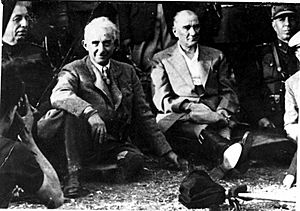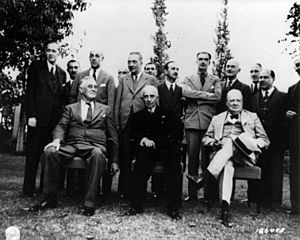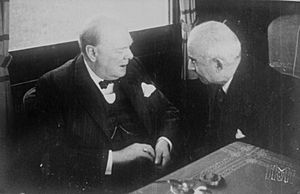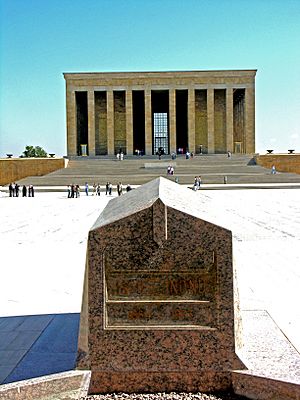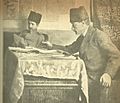İsmet İnönü facts for kids
Quick facts for kids
Millî Şef (National Chief)
İsmet İnönü
|
|
|---|---|
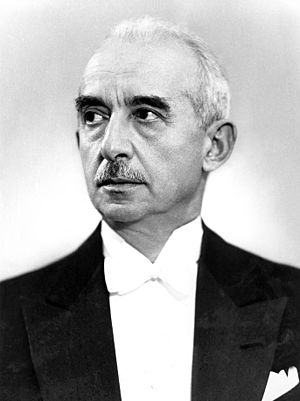
İnönü in 1938
|
|
| 2nd President of Turkey | |
| In office 11 November 1938 – 22 May 1950 |
|
| Prime Minister | Celâl Bayar Refik Saydam Ahmet Fikri Tüzer Şükrü Saracoğlu Recep Peker Hasan Saka Şemsettin Günaltay |
| Preceded by | Mustafa Kemal Atatürk |
| Succeeded by | Celâl Bayar |
| 1st Prime Minister of Turkey | |
| In office 20 November 1961 – 20 February 1965 |
|
| President | Cemal Gürsel |
| Preceded by | Emin Fahrettin Özdilek |
| Succeeded by | Suat Hayri Ürgüplü |
| In office 4 March 1925 – 25 October 1937 |
|
| President | Mustafa Kemal Atatürk |
| Preceded by | Ali Fethi Okyar |
| Succeeded by | Celâl Bayar |
| In office 30 October 1923 – 22 November 1924 |
|
| President | Mustafa Kemal Atatürk |
| Preceded by | Ali Fethi Okyar (as Prime Minister of the Government of the Grand National Assembly) |
| Succeeded by | Ali Fethi Okyar |
| 2nd Leader of the Republican People's Party | |
| In office 10 November 1938 – 8 May 1972 |
|
| Preceded by | Mustafa Kemal Atatürk |
| Succeeded by | Bülent Ecevit |
| Chief of the General Staff of Turkey | |
| In office 20 May 1920 – 3 August 1921 |
|
| Preceded by | Office established |
| Succeeded by | Fevzi Çakmak |
| Minister of Foreign Affairs of Turkey | |
| In office 26 October 1922 – 21 November 1924 |
|
| Prime Minister | Rauf Orbay Ali Fethi Okyar |
| Preceded by | Yusuf Kemal Tengirşenk |
| Succeeded by | Şükrü Kaya |
| Member of the Grand National Assembly | |
| In office 25 October 1961 – 20 November 1972 |
|
| Constituency | Malatya (1961, 1965, 1969) |
| In office 14 May 1950 – 27 May 1960 |
|
| Constituency | Malatya (1950, 1954, 1957) |
| In office 28 June 1923 – 10 November 1938 |
|
| Constituency | Edirne (1923, 1927, 1931, 1935) |
| Personal details | |
| Born |
Mustafa İsmet
24 September 1884 Smyrna, Aidin Vilayet, Ottoman Empire |
| Died | 25 December 1973 (aged 89) Ankara, Turkey |
| Resting place | Anıtkabir, Ankara, Turkey |
| Nationality | Turkish |
| Political party | Republican People's Party |
| Spouse | Mevhibe İnönü |
| Children | 4, including Erdal İnönü |
| Alma mater | Imperial School of Military Engineering Ottoman Military College |
| Signature | |
| Military service | |
| Allegiance | |
| Branch/service | |
| Rank | Orgeneral |
| Battles/wars | 31 March Incident Yemeni Revolt Balkan Wars World War I
|
Mustafa İsmet İnönü (born September 24, 1884 – died December 25, 1973) was a very important Turkish soldier and leader. He served as the second President of Turkey from 1938 to 1950. He was also the Prime Minister three times: from 1923 to 1924, 1925 to 1937, and 1961 to 1965.
Many people see İnönü as a close friend and helper of Mustafa Kemal Atatürk, the founder of modern Turkey. Their friendship began during the Gallipoli campaign. During the Greco-Turkish War (1919–1922), İnönü was the first chief of the general staff for the Turkish army. He led the army in important battles, known as the First and Second İnönü battles. Later, Atatürk gave him the surname İnönü after the place where these battles happened.
İnönü was also a key negotiator for Turkey. He helped create the Mudanya and Lausanne agreements. These talks led to the Treaty of Lausanne, which replaced the unfair Treaty of Sèvres and shaped modern Turkey's borders. As Prime Minister, he helped Atatürk carry out many reforms to modernize Turkey.
After Atatürk's death in 1938, İnönü became president. He was given the special title of Millî Şef (National Chief). During his time as president, Turkey remained neutral during World War II. He also started the process of Turkey becoming a country with more than one political party. He died in 1973 at the age of 89 and is buried near Atatürk in Anıtkabir.
Contents
Early Life and Education
Mustafa İsmet was born in 1884 in Smyrna (now İzmir) in the Ottoman Empire. His father, Hacı Reşit, was a retired official from the War Ministry. His mother, Cevriye, came from a family of scholars. İsmet was the second of five children. Because his father moved for work, the family often lived in different cities.
İsmet finished his early schooling in Sivas in 1894. He then went to military schools. He graduated from the Imperial School of Military Engineering in 1903 as a lieutenant. He continued his studies at the Military Academy, becoming a staff captain in 1906.
Military Career (1903–1923)
Early Military Service
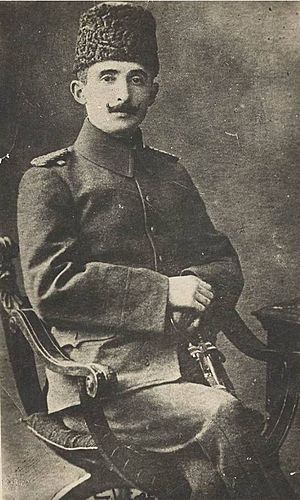
After graduating, İsmet began his military duty in Edirne. He taught military strategy and artillery. In 1907, he briefly joined a group called the Committee of Union and Progress. This group wanted to change the government and remove Sultan Abdul Hamid II. İsmet was part of the army that marched to Istanbul to stop a rebellion. He later left the group in 1909.
İsmet achieved his first military success by helping to stop a revolt in Yemen. He became the chief of staff for the forces sent there. He even negotiated with the rebel leader, bringing Yemen back into the empire. For this, he was promoted to major. He also helped defend Istanbul from Bulgarian attacks during the Balkan Wars. İsmet was a military advisor during the peace talks with Bulgaria. He worked closely with Enver Pasha to reform the army.
World War I and Rise in Ranks
İsmet rose through the military ranks during World War I. He became a lieutenant colonel in 1914 and a colonel in 1915. He started working with Mustafa Kemal Pasha on the Caucasian Front. He commanded different army corps.
Later, he was part of the Palestine Front. His forces faced a major attack at Beersheba. İsmet was wounded in the Battle of Megiddo and returned to Istanbul. During the ceasefire period, he held various administrative jobs in the War Ministry.
Turkish War of Independence
After Constantinople was occupied in 1920, İsmet decided to join the Ankara government in Anatolia. He arrived in Ankara in April and became a representative for Edirne in the Grand National Assembly. The Ottoman government sentenced him to death for joining the resistance.
In May 1920, he was appointed chief of the general staff. The next year, he became commander of the Western Front of the Turkish Army. He led the army during the Turkish War of Independence. He was promoted to general after winning the First and Second Battle of İnönü. In 1934, when Turkey adopted a Surname Law, Mustafa Kemal gave him the surname İnönü to honor these victories.
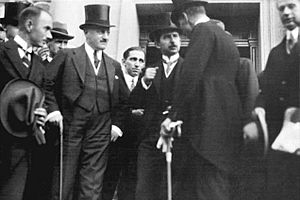
After some losses in July 1921, İsmet Pasha was replaced as chief of staff. However, he continued to serve as a staff officer in later battles, including Dumlupınar.
Chief Negotiator for Turkey
After Turkey won the War of Independence, İsmet Pasha became the main negotiator for Turkey. He led the Turkish delegation for both the Armistice of Mudanya and the Treaty of Lausanne.
The Lausanne conference met in late 1922 to create a new peace treaty. İsmet was known for his strong will. He firmly stated Ankara's position as Turkey's true government. A famous story says he turned off his hearing aid during speeches by the British foreign secretary, Lord Curzon. When Curzon finished, İsmet simply repeated his demands, as if he hadn't heard anything.
Prime Minister (1923–1937)
Mustafa İsmet (who became İnönü in 1934) served as the Prime Minister of Turkey for most of Mustafa Kemal Atatürk's presidency. He helped carry out many of Atatürk's reform programs. It was his idea to make Ankara the capital of Turkey. He also played a big role in declaring Turkey a republic and ending the old religious leadership.
He briefly resigned in 1924 for health reasons. However, he returned to the prime ministry when the new prime minister couldn't gain support from parliament.
National Policies
İnönü focused on creating a strong Turkish national identity. He encouraged the "Turkification" of non-Turkish people. After a rebellion, he supported policies to strengthen Turkish language and culture. He also oversaw a new settlement law in 1934. This law aimed to resettle different groups like Albanians, Abkhazians, and Kurds to create a more unified Turkish state.
Social Reforms
İnönü was responsible for many important reforms during Turkey's one-party period. In 1925, the Hat Law was passed, making Western-style hats mandatory. Religious lodges were also closed. In 1928, the Turkish alphabet switched to Latin characters. In 1934, old titles like Efendi and Pasha were removed. This was also the year he received his surname, İnönü. He also supported replacing foreign words with "Pure Turkish" words.
Economic Approach
İnönü managed Turkey's economy with strong government control, especially during the Great Depression. He used an economic plan similar to the Soviet Union's "Five Year Plan." This meant the government took control of much private property. Even today, a large portion of land in Turkey is still owned by the state.
Atatürk wanted a more open economy. So, in 1937, he replaced İnönü as prime minister with Celâl Bayar. This started a long rivalry between Bayar and İnönü.
Presidency (1938–1950)
Taking Office and Early Actions
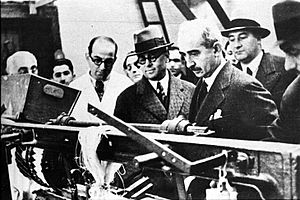
After Mustafa Kemal Atatürk died on November 10, 1938, İnönü was seen as the best person to lead. He was chosen as the second president and leader of the Republican People's Party (CHP). He tried to create a strong public image, receiving the official title of Millî Şef ("National Chief").
One of his first actions was to add the Hatay State to Turkey in 1939. Hatay had declared independence from French Syria. İnönü also wanted Turkey to move towards a system with more than one political party. He tried to do this by creating an "Independent Group" in parliament. However, this didn't work well during wartime. İnönü also removed Bayar's government in 1939 due to disagreements over economic policy. İnönü favored government control, while Bayar wanted a more open economy.
Education saw many improvements during İnönü's presidency. Hasan Âli Yücel, the education minister, helped establish Village Institutes in 1940. These schools trained talented students from rural areas to become teachers and help their communities.
World War II and Neutrality
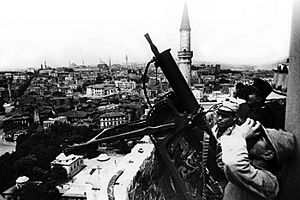
World War II started during İnönü's first year as president. Both the Allies and the Axis powers tried to convince Turkey to join their side. İnönü chose to keep Turkey neutral. He knew that Turkey had suffered greatly in past wars and needed to rebuild. Joining the war would be too risky for the young republic.
Turkey signed a treaty with Britain and France in 1939, promising to join the war if fighting spread to the Mediterranean. However, after France was defeated in 1940, İnönü changed his approach. He signed a German–Turkish Treaty of Friendship in 1941, which helped Turkey stay out of the war. He refused offers from Germany to join the Axis side.
British Prime Minister Winston Churchill met with İnönü in 1943 to try and persuade Turkey to join the Allies. İnönü also met with US President Franklin D. Roosevelt and Churchill at the Second Cairo Conference. İnönü wanted assurances of financial and military aid. He also wanted a guarantee that the US and UK would support Turkey against any Soviet threats after the war.
In August 1944, İnönü broke off relations with Germany. On February 25, 1945, Turkey declared war on Germany and Japan. This allowed Turkey to become a founding member of the United Nations. After the war, fears of a Soviet invasion led Turkey to join NATO in 1952.
Domestic Challenges During Wartime
Staying neutral during the war was hard for Turkey. The country focused on military production, which meant fewer goods for everyday life. Rationing and curfews were put in place. High taxes caused economic difficulties for many people. One controversial tax was the Wealth Tax, which unfairly targeted non-Muslim minorities. This tax was removed in 1944 due to pressure from the US and Britain.
A famous story about İnönü happened during an election campaign in 1969. A young man complained that İnönü had left them without food. İnönü replied, "Yes, I let you go without food, but I did not let you become fatherless." He meant that he kept Turkey out of the war, saving many lives.
Moving Towards Democracy
Leaders in Turkey always wanted the country to become a democracy. İnönü openly said that Turkey needed an opposition party. He welcomed Celâl Bayar forming the Democrat Party (DP) in 1946. However, new leftist parties were quickly banned due to fears of communism. İnönü also established the Ministry of Labour in 1945 and passed laws to protect workers.
İnönü allowed Turkey's first multiparty elections in 1946. However, these elections were not completely fair. Voting was not secret, and counting was not public. İnönü had to act as a mediator between his party and the Democrat Party. He promised to be fair to both the government and the opposition.
In 1950, truly free and fair elections were held. İnönü's government was defeated by the Democrat Party. The DP won a large majority of seats. İnönü oversaw a peaceful transfer of power to the DP leaders, Bayar and Adnan Menderes.
Leader of the Opposition
For ten years, İnönü served as the leader of the opposition. During this time, the CHP created youth and women's branches. They also proposed allowing trade unions and giving workers the right to strike.
Before the 1960 elections, İnönü faced harassment from the authorities and supporters of the ruling party. He was even banned from parliament sessions. This period saw the Democrat Party become more authoritarian, leading to a military coup against the government.
Second Republic
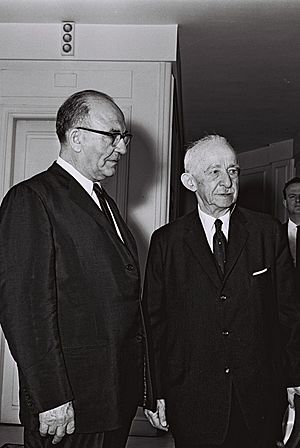
On May 27, 1960, the Turkish Armed Forces overthrew the government. After a year of military rule, new elections were held in 1961. İnönü returned to power as Prime Minister. Even though he had advocated for Adnan Menderes to be pardoned, some right-wing groups still blamed İnönü and the CHP for Menderes' execution.
İnönü's new governments tried to ease tensions between radical military groups and former Democrat Party members. Since his party didn't win a majority, he formed coalition governments with other parties. These coalitions sometimes angered radical officers, leading to attempted coups in 1962 and 1963. İnönü survived these attempts.
During this time, İnönü's government established important institutions like the National Security Council and the TÜBİTAK (Turkey's leading research institute). Turkey also signed an agreement with the European Economic Community (now the European Union). The army was modernized, and the National Intelligence Organization was founded.
İnönü helped shape the CHP as a "Left of Center" party. A new group of younger leaders, led by Bülent Ecevit, became more influential. İnönü survived an assassination attempt in 1964.
İnönü returned to the opposition after losing the 1965 and 1969 elections to Süleyman Demirel. He remained leader of the CHP until 1972. He lost a leadership contest to Ecevit, which was the first time a party leader was overthrown in such a contest in Turkey's history. İnönü then left his party and resigned from parliament. As a former president, he became a member of the Senate in his last year of life.
Death
İsmet İnönü died on December 25, 1973, from a heart attack. He was 89 years old. The parliament declared a period of national mourning. He was buried at Anıtkabir on December 28, across from Atatürk's mausoleum. His tomb was given its current design in 1997.
Legacy
Several places are named after İsmet İnönü, including İnönü University and Malatya İnönü Stadium in Malatya. The İnönü Stadium in Istanbul, home to the Beşiktaş football club, is also named after him.
Personal Life
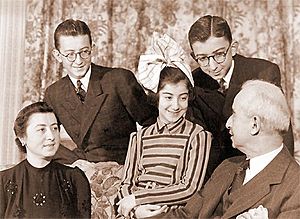
İnönü was a very educated man. He could speak Arabic, English, French, and German, in addition to Turkish. He married Emine Mevhibe in 1916. They had four children: İzzet (who died as a baby), Ömer, Erdal, and Özden. Erdal İnönü became a physicist and later a statesman, following in his father's footsteps in politics.
İnönü was known for his slight build and a hearing problem. He sometimes used his hearing impairment to his advantage in negotiations, especially during the Lausanne Conference. Because of this, he was sometimes called "The Old Fox." He also developed a love for Western Classical Music during his time in Yemen, an interest he kept throughout his life.
Honours
National Honours
 Turkey :
Turkey :  Medal of Independence, November 21, 1923
Medal of Independence, November 21, 1923
Images for kids
-
With Mustafa Kemal Atatürk near the front lines in the Turkish War of Independence
-
With Benito Mussolini, 1932
-
With Refik Saydam, 1939
-
With Atatürk and Reza Shah Pahlavi
See also
 In Spanish: İsmet İnönü para niños
In Spanish: İsmet İnönü para niños
- Pembe Köşk – İnönü's private home from 1925 to 1973
- Çankaya Köşkü – The Presidency of the Republic of Turkey
- List of high-ranking commanders of the Turkish War of Independence


